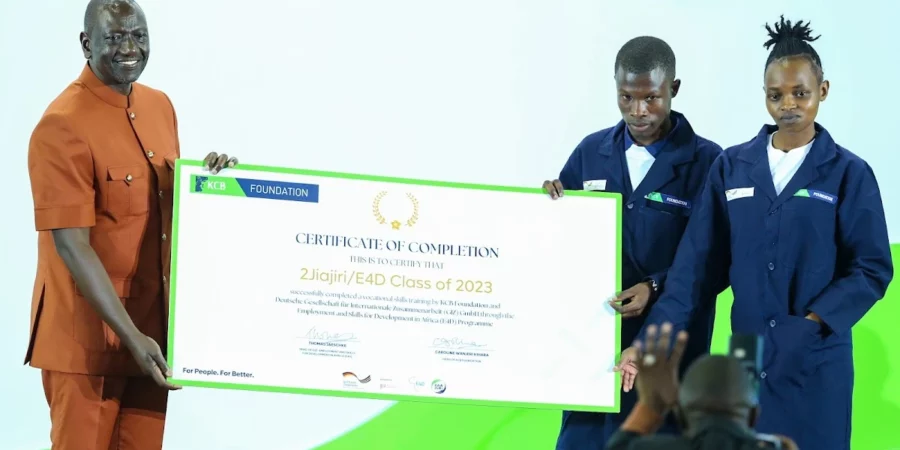In a move to address the concerning issue of youth unemployment, the Kenyan government is considering the consolidation of internship programs for fresh graduates through collaborative efforts with both private and public organizations. This proposal was hinted at by President Ruto, pending discussions among stakeholders to formulate a comprehensive framework that would be supported by the government through incentives.
Internship programs, lasting between six and 24 months, could potentially receive financial support from the government. President Ruto mentioned that in cases where companies are already paying up to Sh20,000, the government could contribute, for instance, Sh12,000. The President made these remarks during the graduation ceremony of the 2023 KCB 2jiajiri program in Nairobi.
The KCB 2jiajiri initiative, a flagship program of the KCB Foundation in collaboration with the German government, aims to alleviate youth unemployment by equipping young, unemployed, and out-of-school individuals with technical skills and training opportunities. The initiative’s primary goal is to empower participants to establish and grow micro-enterprises, transitioning them from the informal to the formal sector.
The partnership further facilitates market and industry connections, providing participants with a holistic approach to building successful businesses. This year’s edition saw 3,500 graduates from the construction sector.
Highlighting the need to address the challenge of releasing fresh graduates into the job market without sufficient employment opportunities, President Ruto emphasized the importance of a consolidated internship program. Kenya’s youth, constituting approximately 80% of the population, are disproportionately affected by the unemployment crisis. Youth Congress, an NGO advocating for youth issues, reveals that out of every 10 unemployed individuals in Kenya, seven are aged 35 or below.
According to Statista data, the youth unemployment rate in Kenya remained relatively stable between last year and the previous year. However, the Kenya National Bureau of Statistics (KNBS) reported an increase in the number of jobless Kenyans to over 2.97 million for the three-month period ending December last year.
The most impacted demographic group in terms of unemployment are young people below the age of 29, particularly secondary school and college graduates, totaling approximately 1.54 million individuals. This situation highlights the deepening crisis of youth unemployment in the country.
Kenya’s labor market has seen minimal change since 2013, as indicated by the Kenya Institute for Public Policy Research and Analysis (KIPPRA). The youth, accounting for 38.9% of the hardest-hit population by unemployment, witness around 800,000 new entrants into the labor market annually from higher education institutions.
The World Bank ranks Kenya with the highest number of unemployed youths in East Africa. In addition to the proposed consolidated internship program, President Ruto revealed that the Ministry of Trade is actively working on facilitating the export of Kenya’s skilled labor force, particularly from the artisanal sector, to other African nations via the African Continental Free Trade Area.
President Ruto expressed the government’s dedication to creating more employment opportunities for the youth by focusing on initiatives that enhance their skills, making them well-suited for the job market. “Proper skilling of the youth will also boost our local manufacturing industry, thereby expanding our export market. Currently, we are in discussions with the European Union to expand the market access of Kenyan products in their countries,” President Ruto stated.



Leave a Reply